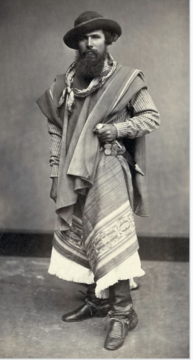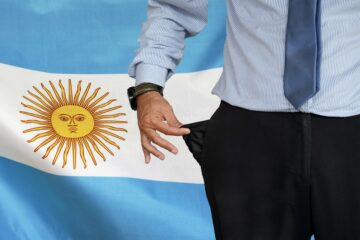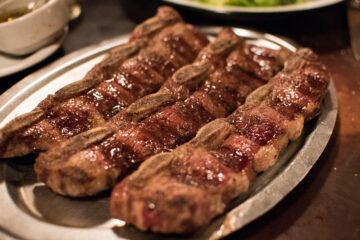by Mark Harvey
“It is not often that you see life and fiction take each other by the hand and dance.” ―Lawrence Thornton, Imagining Argentina

Watching the recent elections in Argentina makes an arm-chair economist like me face-palm myself. The country that was once one the richest in the world, the country that has an embarrassingly large assortment of riches—wheat, oil, soybeans, cattle, olives, grapes, minerals and the like–can’t get out of its own way when it comes to retaking its place as a wealthy nation.
In November, Argentina elected Javier Milei, the self-described anarcho-capitalist, as its new president. Milei has a little of everything—a dash of Brazil’s ex-president Bolsonaro, a dash of Trump, and a dash of Elon Musk. He’s like one of those fruitcakes passed around at Christmas with all the colorful little radioactive bits that you can’t quite identify.
Milei was a blasphemous candidate, calling Pope Francis—himself an Argentine– an hijo de puta (son of a bitch), calling the president of Brazil (Argentina’s second biggest trading partner) a corrupt communist and even taking a shot at Micky Mouse, comparing him “…to every Argentine politician because he is a disgusting rodent whom everybody loves.” He’s also a climate-change denier who believes the sale of human organs should be legal and even dithers on the sale of children, saying that it’s essentially context-dependent.
Milei has four dogs, all cloned by a US firm called PerPETuate from his late mastiff Conan. The four dogs are named after his favorite economists, Murray (Rothbard), Milton (Friedman), Robert (Lucas), and Lucas (also named after Robert Lucas). He cloned his dogs because Conan was truly his best friend and according to an unauthorized biography, Milei still communicates with Conan through an interspecies medium. Some have called Argentina’s new president “barking mad.” What could possibly go wrong?
In his campaign, he vowed to rid Argentina of its central bank, dollarize the peso and cut out the ministry of Health, Culture, Labor, Social Development, and Education in the Argentine government. Given that Argentina has defaulted on its debt nine times and has had out-of-control inflation numerous times, sometimes as high as 5,000 percent, getting rid of its central bank might not be such a bad idea.

Much of Argentina’s early history involved an isolated agrarian economy with few exports. But from about 1870 to 1930, with a lot of British investments, the country became an exporting powerhouse. The primary exports were wheat, corn, cattle, linseed, and mutton and by the early 1900s, it was one of the richest five countries in the world, based on per capita income. In that era, Argentina built thousands of miles of railway and was expected to become the United States of South America.
Things have changed. Today Argentina is ranked 66th in the world in GDP per capita, or somewhere around $14,000 per person per year. By comparison, the United States GDP per capita is close to $75,000.
Gifted at so many other things, Argentines are just horrible at managing their economy. The disparity between its economic position at the early part of the 20th century versus its position now is so marked that economists even have a saying to describe it. It goes, there are four types of economies: advanced, developing, Japan, and Argentina. The saying is meant to describe the trends of advanced economies getting richer faster, while developing economies get richer slower. Japan and Argentina are two exceptions to these trends with Japan being a once poor country that got very rich and Argentina being a once rich country that somehow became poor.
The country started the habit of borrowing more than it could reasonably pay way back in the 1820s when it issued bonds to finance early development. The bonds were bought in London but when the Bank of England raised interest rates, Argentina defaulted on its debt in 1827. The lesson was not learned by either Argentina or England and the two countries repeated the process in the late 19th century when the country borrowed heavily to build railroads and Buenos Aires itself. In the 1890s Argentina stopped making interest payments and nearly brought Barings Bank down in London.
 The country defaulted three more times in the 20th century (1951, 1982, and 1989) and with less than a quarter of the 21st century over, it has already defaulted four times (2001, 2014, 2019, and 2020).
The country defaulted three more times in the 20th century (1951, 1982, and 1989) and with less than a quarter of the 21st century over, it has already defaulted four times (2001, 2014, 2019, and 2020).
Just across the Andes in the long narrow country that stretches from Peru to Cape Horn, Chileans have the same passion for soccer as the Argentines and though they have fielded some great teams, they’ve never consistently played at the same level as their neighbor and never won the World Cup. But when it comes to managing a tight economy, they are playing in a different league. Chile has maintained a stable currency for decades with minimal inflation and only defaulted on its external debt once, way back in the early 1970s. Between 2000 and 2020, the average rate of inflation was barely more than 3 percent. In 2022, the Chilean government ran a four-billion-dollar surplus on its spending while Argentina ran a twenty-one-billion-dollar deficit. Chilean bonds consistently receive single A ratings while Argentine bonds receive C ratings.
Chile’s success at managing its economy is usually attributed to a period in the 1970s when the brutal dictator Augusto Pinochet sent a string of young economists to the University of Chicago to study under Milton Friedman. They were called “The Chicago Boys” and they began a tradition of very disciplined central bankers and economists. While Argentina’s economy has resembled a bucking bronco for the last 30 years, Chile has been riding a gaited horse. Part of this probably has a lot to do with the Chilean personality, which is long on practical skepticism and loathe to take big financial risks. Things aren’t perfect in Chile by any means with big disparities in income. But it’s been a long time since a person there used the national currency to wallpaper the interior of their house as an expression of disgust for out-of-control inflation, which has been known to happen in Argentina.
It’s hard not to love Argentina if you don’t actually have to run a business there or live on precarious savings at the mercy of their central bankers and economic ministers. For the country has it all: stupendous mountains and rivers, vast pampas, steaks and short ribs to make you weep, good wine, beautiful people, dreamy tango music, celestial-level soccer, and superb writers.
But when it comes to governing and managing ministries and the economy, that nation is forsaken. It has a long string of self-dealing presidents who rotate in and out favor, in and out of office. In the dozens of conversations I’ve had with gauchos, taxi drivers, mountain climbers, lawyers, and every stripe of Argentine in between, I don’t think I’ve ever heard one say an unalloyed nice thing about a minister or a president. They are all criminales, ladrones, inutiles, or vagos (criminals, thieves, useless, or lazy). The truth is, a lot of them are.
I’m not sure I’m wrong to say that Argentines are so accustomed to inept and corrupt governments that they’d be a little forlorn if the trains ran on time and the peso was stabilized. Dinner conversations would offer much less to talk about, and taxi drivers would get bored just giving expert analysis on recent soccer games.
Despite a bewitched economy, Argentines have an unmatched flair for life in how they dress, eat, talk, drink, and dance. Which brings us to Tango.

When I lived in Santiago, Chile, I took tango lessons from a beautiful young Chilean woman. She had her own studio and a couple of times a week I would lumber in there, with my crush on her, and try my best at Tango. Over the course of some weeks dancing to La Cumparista, Por una Cabeza, and the like, I came to think I was really the second coming of Carlos Gardel. But one day in the middle of a lesson, the instructor took my hands, flung them off her waist, and said with anger, “Tango is a dance, not a march! Now dance for God’s sake!” So much for my dreams of taking the show to Buenos Aires. Tango really does fit Argentina as the national dance. It’s dramatic, melancholy, menacing, and sexy when done right. It’s hard to take your eyes off the good dancers as they glide around the floor, intricately entwining their arms and legs and moving in and out of each other’s embrace. The piano, violin, and accordion somehow join strains of old Europe with the new world of the pampas and the Andes.
Trying to write about good dancing is probably a bad idea, especially for a poor dancer like me. But there is something more to the music and the dance that is both direct and dark—almost a criminal quality to the erotic patterns as if, yes, love can be stolen and kept. At least that’s what I saw when I went to tango shows in Buenos Aires or watched the street dancers in La Boca or San Telmo. A good pair of tango dancers parlay a sort of lethal commitment to life and love that you just won’t find at a square dance in Idaho after a potato harvest. And that’s Argentina, where effective central banking takes a distant backseat to the better things in life like great futbol, a languorous meal of steaks and Malbec, espresso-fueled conversations, or a love affair.

A good lunch in Argentina rises to the epicurean equivalent of Messi or Maradona. At some pretty reasonably-priced restaurants in Buenos Aires, Mendoza, or Rosario a person can sit down at an elegantly set table, be seated and served by a formal waiter with a certain severity, and tuck into a steak or a cut of short ribs that, for a carnivore, borders on the religious. If an Argentine bond gets a C rating, a good steak or set of short ribs down there gets a triple-A.
The quality of their beef may have a lot to do with it being grass-fed and grass-finished. Here in the States most beef that is labeled grass-fed is usually grain-finished and might lose some of its flavor in the industrial process. The Argentines also become grill masters from about age eight.
And of course, there is the ridiculously cheap Malbec, Tannat, Syrah, and Cabernet Sauvignon wine. For about $20 you can order an excellent varietal.
What’s interesting about Argentina’s new president is that a lot of Argentines whom I respect believe he’s needed and will do a good job. I’m not sure if their enthusiasm is about him or really just abject disgust at so many corrupt and inept presidents over the many previous decades.
In his first few days in office, Milei has devalued the Argentine Peso by half, and promised to halve the number of government ministries, more than double import taxes, reduce government subsidies to the provinces, and suspend public works. The World Cup-winning country is in for some pain and austerity.

And who knows: surrounded by his four canine economists, Murray Rothbard, Milton Friedman, and two Robert Lucas’s, Milei might turn the Argentine economy around.
Robert Lucas, the human, won his Nobel Prize for his theory on Rational Expectations. The theory holds that people make rational economic decisions based on broad considerations of past experience and immediate economic factors such as inflation and interest rates. It concludes, therefore, that having a stable monetary policy is a good idea. Good dog, Lucas!
